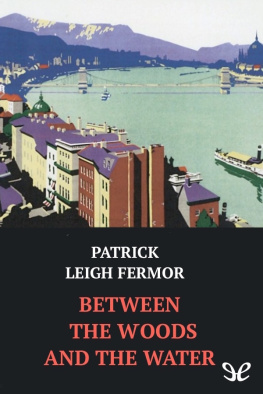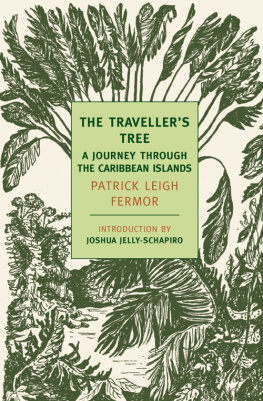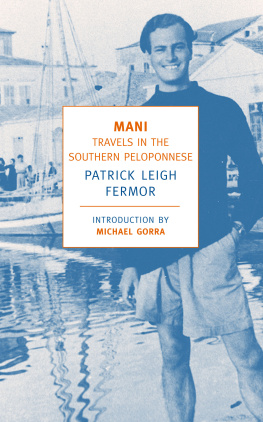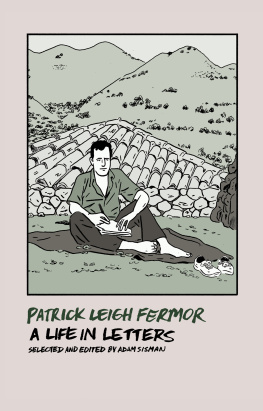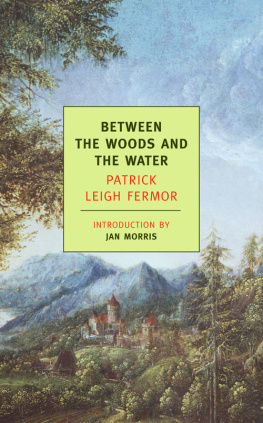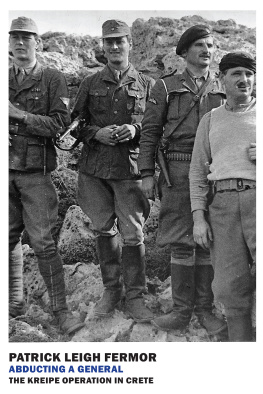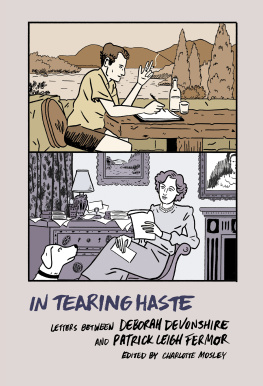Patrick Leigh Fermor - A Time of Gifts
Here you can read online Patrick Leigh Fermor - A Time of Gifts full text of the book (entire story) in english for free. Download pdf and epub, get meaning, cover and reviews about this ebook. year: 1977, publisher: ePubLibre, genre: Home and family. Description of the work, (preface) as well as reviews are available. Best literature library LitArk.com created for fans of good reading and offers a wide selection of genres:
Romance novel
Science fiction
Adventure
Detective
Science
History
Home and family
Prose
Art
Politics
Computer
Non-fiction
Religion
Business
Children
Humor
Choose a favorite category and find really read worthwhile books. Enjoy immersion in the world of imagination, feel the emotions of the characters or learn something new for yourself, make an fascinating discovery.
- Book:A Time of Gifts
- Author:
- Publisher:ePubLibre
- Genre:
- Year:1977
- Rating:5 / 5
- Favourites:Add to favourites
- Your mark:
- 100
- 1
- 2
- 3
- 4
- 5
A Time of Gifts: summary, description and annotation
We offer to read an annotation, description, summary or preface (depends on what the author of the book "A Time of Gifts" wrote himself). If you haven't found the necessary information about the book — write in the comments, we will try to find it.
A Time of Gifts — read online for free the complete book (whole text) full work
Below is the text of the book, divided by pages. System saving the place of the last page read, allows you to conveniently read the book "A Time of Gifts" online for free, without having to search again every time where you left off. Put a bookmark, and you can go to the page where you finished reading at any time.
Font size:
Interval:
Bookmark:

At the age of eighteen, Patrick Leigh Fermor set off from the heart of London on an epic journey--to walk to Constantinople. A Time of Gifts is the rich account of his adventures as far as Hungary, after which Between the Woods and the Water continues the story to the Iron Gates that divide the Carpathian and Balkan mountains. Acclaimed for its sweep and intelligence, Leigh Fermor's book explores a remarkable moment in time. Hitler has just come to power but war is still ahead, as he walks through a Europe soon to be forever changedthrough the Lowlands to Mitteleuropa, to Teutonic and Slav heartlands, through the baroque remains of the Holy Roman Empire; up the Rhine, and down to the Danube.
At once a memoir of coming-of-age, an account of a journey, and a dazzling exposition of the English language, A Time of Gifts is also a portrait of a continent already showing ominous signs of the holocaust to come.
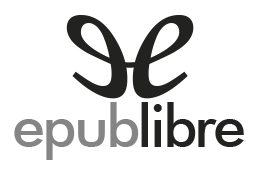
Patrick Leigh Fermor
On Foot to Constantinople: From the Hook of Holland to the Middle Danube
ePub r1.0
Titivillus 06.09.15
Patrick Leigh Fermor, 1977
Editor digital: Titivillus
ePub base r1.2
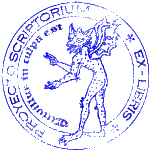

PATRICK LEIGH FERMOR was born in 1915 of English and Irish descent. After his stormy schooldays, followed by the walk across Europe to Constantinople that begins in A Time of Gifts (1977) and continues through Between the Woods and the Water (1986), he lived and traveled in the Balkans and the Greek Archipelago. His books Mani (1958) and Roumeli (1966) attest to his deep interest in languages and remote places. In the Second World War he joined the Irish Guards, became a liaison officer in Albania, and fought in Greece and Crete. He was awarded the DSO and OBE. He now lives partly in Greece in the house he designed with his wife Joan in an olive grove in the Mani, and partly in Worcestershire. He was knighted in 2004 for his services to literature and to British-Greek relations.
Envy is the writers sin, as everyone knows, but there can be few writers in the English-speaking world who resent Patrick Leigh Fermors preeminence as one of the great prose stylists of our time. He has no rivals, and so stands beyond envy.
His literary genre is difficult to define. He is generally classified as a travel writer, but he is really infinitely more than that. Certainly he describes the experiences of travel as providing a theme for his literature, but he is also a memoirist, a historian, a connoisseur of art and architecture, a poet, a humorist, a story-teller, a social chronicler, something of a mystic, and one of Gods own adventurers. These varied gifts were first revealed in full glittering ensemble in A Time of Gifts, published in 1977 when he was sixty-two years old.
By then he had lived half an eventful lifetime, and had already published three much-admired books of travel. A born irregular, he had happily abandoned an expensive formal education in his seventeenth year, and joined the British Army at the start of World War II. From the ultra-formal Irish Guards (he is half Irish by descent) he gravitated naturally to guerrilla warfare, his obvious military metier, and in 1942 crowned his career as a licensed ruffian by organizing the abduction of a German general in occupied Crete, and whisking him away to Egypt in a motor launch.
Living in Cretan caves disguised as a shepherd probably came easily enough to Leigh Fermor, and A Time of Gifts tells us why. He was built that way. Nine years before Major Patrick Leigh Fermor, holed up in the Cretan mountains with his accomplices, was making final arrangements to kidnap General Kreipe, the strapping young Paddy Leigh Fermor, fresh from Kings School, Canterbury, was stepping from a steamer at the Hook of Holland preparing to walk across Europe to Constantinople. He saw himself as a Wandering Scholar. He was alone, and he was ready to sleep anywhere, talk to anybody, live on almost nothing, eat or drink anything, have a go at any language, make friends with strangers rich or poor, and brave the worst that heat and cold, mishap and blister, officialdom, prejudice and politics could do to him. What could be better preparation for subversive skullduggery in Crete?
There could be no better material, either, as it turned out long afterwards, for a retrospective book, looking back at pre-war Europe across a darkling plain of history and experience. The young Leigh Fermor had made his trek across the continent at a fateful moment of European history. The 1930s were a remembering time, and a waiting time too. Still alive in the public consciousness was the old Europe, the Europe of the princes and the peasants, of Franz Joseph and Kaiser William, of grand old cities still intact and ancient traditions honored. But intermittently present in the public mind too, if generally suppressed, was the apprehension of catastrophe to come: 1933, the year Leigh Fermor set foot in Germany for the first time in his life, was the year Adolf Hitler came to power.
As Leigh Fermor says himself, at the time he didnt give a damn. It is one of the fascinations of A Time of Gifts that its journey is in effect evoked for us by two people: the carefree young dropout who experienced it, and stored it up in memory and in diary, and the immensely experienced author who, knowing more about history forty years later, turned it into art.
* * *
Being altogether sui generis, A Time of Gifts behaves just as it pleases. It follows no precedent, obeys no conventions. The nearest equivalents I can think of are the works of Ibn Batuta, written over a lifetime six centuries before, or John Ruskins unclassifiable work of memoir, philosophy, and travel, Praeterita. More obvious predecessorsAlexander Kinglakes Eothen or Robert Byrons The Road to Oxianaare different in kind to my mind because they do not reflect, as this book does, at once the maturing of a mind and the condition of a continent. Besides, Leigh Fermor is Leigh Fermor, and neither Kinglake nor Byron kidnapped any generals
The Cretan adventure of 1942 pervades the narrative of 1933, because it obviously pervaded the mind of the author in 1977. His introductory essay to the book, addressed to his comrade-in-arms Xan Fielding, hints at the wartime coup, and means that it pervades our own minds too. For this is by no means a simple memoir of travel: it is full of allusions, afterthoughts and cross-references, backwards and forwards, in and out, and it is tantalizingly open-endedit finishes halfway to Constantinople, and the reader is left waiting for a later volume to get there.
The form of the book is layered, too. Sometimes it is imaginatively exploited reminiscence, sometimes pure impressionism. Sometimes it contains suggestions of what is to happen later, all unknown to the young traveler. There are virtuoso displays of scholarship and insight beyond the powers of any nineteen-year-old, but there are also reported responses so evidently immediate, so engagingly openhearted, that they could only come from Paddys own notebooks, scribbled in hayrick, drawing room, or hospitable pub en route. Leigh Fermor is not only remembering himself, he is looking at himself too, as in one of those Cubist paintings in which we see profile and front face at the same time.
Font size:
Interval:
Bookmark:
Similar books «A Time of Gifts»
Look at similar books to A Time of Gifts. We have selected literature similar in name and meaning in the hope of providing readers with more options to find new, interesting, not yet read works.
Discussion, reviews of the book A Time of Gifts and just readers' own opinions. Leave your comments, write what you think about the work, its meaning or the main characters. Specify what exactly you liked and what you didn't like, and why you think so.


